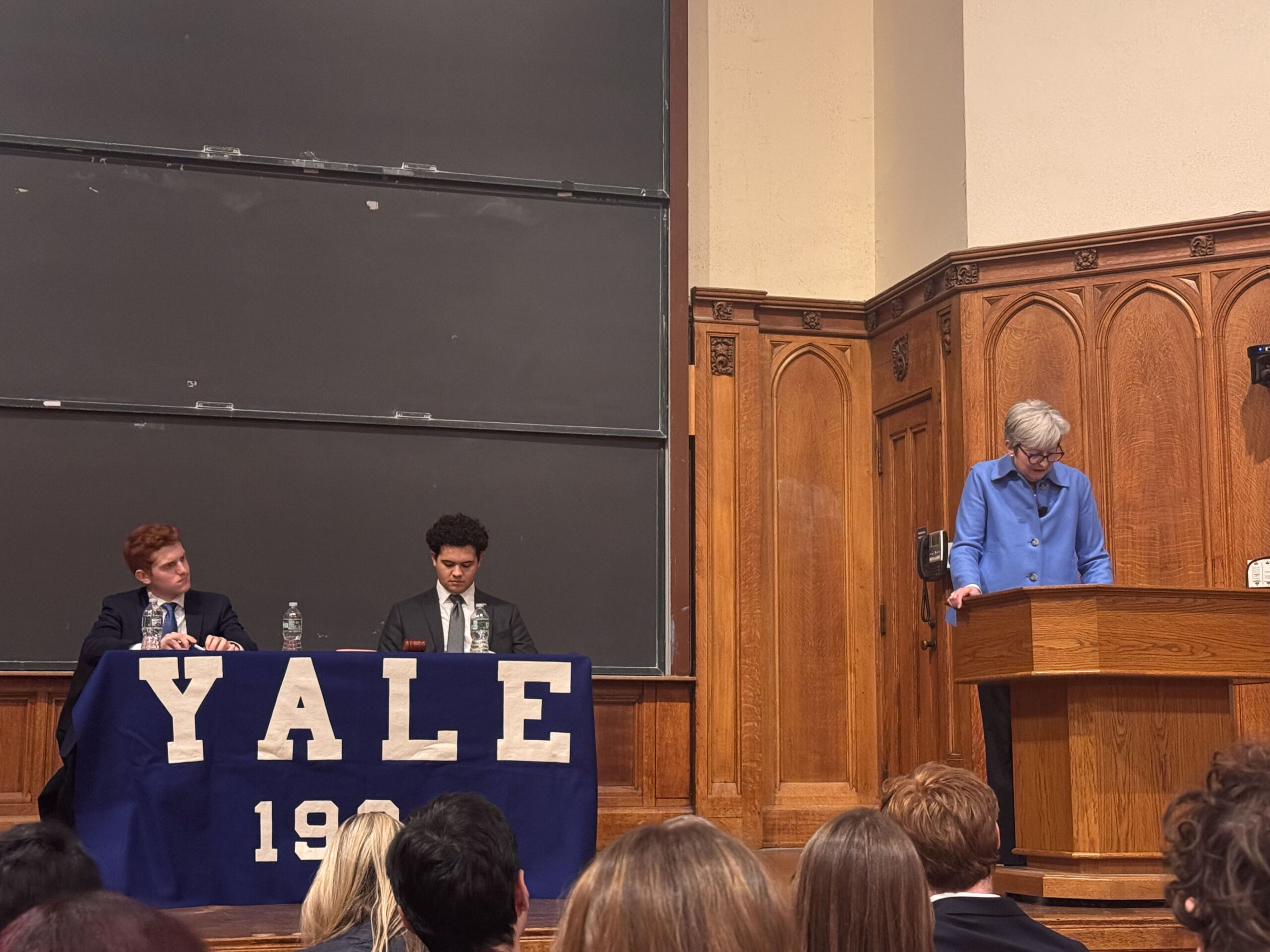Former UK Prime Minister Theresa May urges moderation, compromise at YPU debate
May, a former Prime Minister of the United Kingdom, challenged students to believe in the strengths of moderation as a virtue in politics at a Yale Political Union debate.

Baala Shakya, Staff Photographer
Baroness Theresa May, who served as the British Prime Minister from 2016 until her resignation in 2019, addressed over 400 students during the sold-out Yale Political Union debate.
May, former leader of the British Conservative Party whose premiership was dominated by controversial decisions, including Brexit, was introduced by YPU President Leo Greenberg ’26, who claimed her “moral clarity and her dedication to public service have made her an inspiration on both sides of the Atlantic.”
She began the debate by recalling the words of a fellow constituent, Sir Nicholas Winton: “Remember Theresa, compromise is not a dirty word.”
“Sadly, in today’s politics, compromise has come to be seen increasingly as a dirty word, as has moderation,” said May. “And, moderation is too often seen as a weakness, just as compromise is too often seen as a weakness, but they are not. They are actually signs of strength.”
May then reflected upon her time as Prime Minister, when she took responsibility for the Brexit negotiations. At the mention of Brexit, May jokingly motioned to the audience to hiss louder in disapproval.
In 2016, 52 percent of the British populace voted to leave the European Union, and 48 percent voted to remain.
May told the audience that she was a “Remainer,” meaning she opposed leaving the EU, but as Prime Minister, she believed that it was her duty to “uphold the democratic view.” She conceded that because the vote was so close, she believed that a Brexit recognizing the concerns of the Remainers should have taken place.
“But what happened in the House of Commons was [that] the hardline Brexiters wanted the ideological purity of their particular version of Brexit,” May said. “And on the other side, there were some hardline Remainers who wanted to overturn the democratic vote.”
May claimed that the result of this dispute led to her deal “not going through,” and thus, she resigned as Prime Minister.
“I still to this day believe that my deal would have been better for the greater good,” she added.
While May relented that individuals may see the “voice of moderation” as having no values or principles, she said that the view was “absolutely wrong.”
May then urged students to embrace moderation and compromise in an era of growing political polarization. Reflecting on her tenure as prime minister and emphasizing the importance of pragmatic governance over ideological rigidity, May preached how “today’s atmosphere of absolutism and polarization … drowns out moderation.”
“I fear that too many in politics have forgotten that the people politicians are there to serve are the public,” said May. “Being in politics and being in government is a public service. It isn’t that tricky. It’s in the name.”
Throughout her remarks, May acknowledged the challenges of balancing principle with pragmatism. May described the Brexit negotiations as a lesson in compromise, noting that political leaders often face difficult choices that require them to bridge divides.
She remarked that progress is often made not through absolute victories but through “incremental change.”
May then proceeded to call upon those in the room who are considering pursuing a career in politics or public service to heed her advice as she outlined “how to be a good politician.”
At the conclusion of her speech, May emphasized that leaders are elected not to serve themselves but to serve the public. She urged students to remember that politicians have a duty of service, a duty to listen to others, and a duty to the public good.
“[To be] an effective member of government, you need to be able and willing to explore views beyond your own,” May preached. “You need to know that you have a strong policy idea, a strong view on a particular issue, and believe that that is absolutely the right one. [But,] you need to challenge that [and] listen to people with a different view.”
After the talk, AJ Tapia-Wylie ’26, the former speaker of the YPU, asked the Baroness whether she believes the parliamentary system promotes moderation to a greater extent than the two-party system, which the U.S. has.
May answered that while she had not thought about such a comparison in terms of facilitating moderation, she believes that when “you have the opportunity for other parties to be in Parliament, then you are more likely to have that voice of moderation.”
Opposing May’s speech, Abhinay Lingareddy ’26 stated that “truth does not have a middle.” He argued that things are either true or not true and “either virtuous or not virtuous.” In order to find truth in democracy, Lingareddy claimed that “we have to engage in uncivil discourse. We must shout and scream sometimes” and that he would rather have “no union” than a “false union.”
Camillo Padulli ’25, who is from the United Kingdom, also took the stage to voice his opposition to viewing moderation as a virtue in politics.
“Moderation at [its] very best brings stagnation, [and] at its worst it brings decline,” Padulli said. “The time for moderation is past. The time for reaction is now … As a conservative, what is there left to conserve?”
At the conclusion of the debate, the affirmative prevailed 99-33-3 on “Resolved: Moderation is a Virtue in Politics.”
The Yale Political Union is the oldest collegiate debate society in the U.S., founded in 1934.
Correction, Feb. 6: This story has been updated to correct Leo Greenberg’s ’26 quote.







